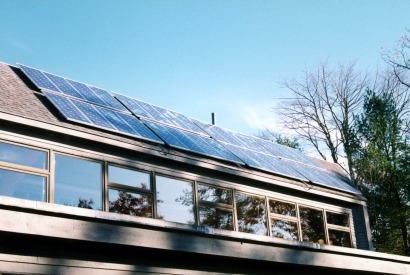
An amendment to the draft legislation, if passed, would leave homeowners eligible for money if their installation generates only heat from a renewable source. If the installation also generates electricity, it won’t qualify.
This is because renewable electricity generation is already encouraged under the Feed-in Tariff (FIT). The RHI is an equivalent incentive for heat and so this means that if homeowners wanting to cash in on both schemes would have to install a separate unit for each incentive.
At present, industry experts are placing more attention on ‘hydrid’ approaches to carbon reduction and technology that generates both heat and electricity from the sun already exists and has been certified under separate industry standards. Furthermore, the government has also reportedly awarded grants of £2m to companies developing such ‘PV-T’ (Photovoltaic Thermal) technology. Hundreds of units have also been installed in UK homes and the efficiency gains are widely celebrated as, in effect, they do two jobs at once. British Gas has recently completed a successful 12-month assessment, which clearly demonstrates the benefits of PV-T in domestic applications.
The UK is currently a global leader in the development of PV-T and its applications and UK industry is involved in a project to develop the biggest PV-T system on the planet. PV-T installations already qualify under the Commercial RHI, which was implemented in 2011. On the assumption that the same rules would apply to the delayed Domestic RHI, homeowners have gone ahead and installed PV-T on the assumption that it would generate two separate streams of income – one under the FIT (for renewable electricity) and another under the RHI (for renewable heat).
However a last-minute amendment to the Domestic RHI would mena that homeowners won’t be afforded the same rights as those applying to industries and businesses under parallel legislation.
“The Government’s policies on the Renewable Heat Incentive (RHI) and Feed in Tariffs (FiTs) are designed to encourage people to be more energy efficient and drive down carbon emissions” said a spokesperson from the Department of Energy & Climate Change (DECC). “Solar PV-T is a relatively new technology. We consulted on the domestic RHI policy in September 2012 when there was little evidence available on this technology. We therefore decided that it should not be eligible at the launch of the RHI scheme. If those who install measures through RHI were also paid a FiT, the Government may be paying them twice which would represent over-compensation and poor value for money for the tax payer. The Government will consider the appropriate level of support while examining the case for new technologies.”
However, benefitting from both schemes cannot be seen as double counting because for every 1,000 watts of the sun’s energy, approximately 15% is used for the production of electricity while a further 55-65% is converted into heat. This effectively means PV-T converts up to 80% of the sun’s power into useful heat or electricity, displacing more CO2 per square metre than any other solar technology. Simply put, solar energy is not being used twice - it is being used for the production of either electricity or heat.
“This is yet another barrier erected by DECC for those trying to innovate in the green industrial revolution that Coalition ministers championed so enthusiastically while in opposition” said Jeremy Leggett, Founder and Chairman of Solarcentury. “What a contrast to the bend-over-backwards policy approach shale frackers and nuclear benefit from.”
Given that the government already embraces PV-T through the Commercial RHI it would appear that it accepts the technology as a viable method of generating both heat and electricity. The technology has also been in existence since the 1970s and been commercially available in the UK for the last ten years.
However, in a letter to Natural Technology Developments Ltd, a company specialising in the design and deployment of PV-T, Greg Barker, UK Energy and Climate Change Minister stated:
“We consider PV-T to be a new technology that can potentially offer the benefits of dual generation of heat and electricity in a cost-effective way. Being a new technology, we need to ascertain whether, for the purposes of the domestic RHI, it meets our eligibility criteria. The responses we received to [the public consultation in September, 2012], together with low deployment levels to date, offered little evidence to satisfy us that PV-T currently meets those criteria. In particular, the need for a technology to be fully proven, commercially available and able to make a significant contribution to the deployment of renewable heat at cost effective levels at a domestic scale.”
According to Jo Walters, Director of Natural Technology Developments Ltd, the 2012 consultation did not list PV-T as a technology to be excluded in the Domestic RHI – and the consultation document does not consult upon an exclusion of solar thermal panels that also generate electricity.
The government has yet to give a satisfactory explanation for what is essentially a U-turn and any justification for why PV-T is deemed sufficiently ‘proven’ for the Commercial RHI, but not for the Domestic RHI. The legislation will be discussed by committee before passing to the House of Lords.
For additional information:

